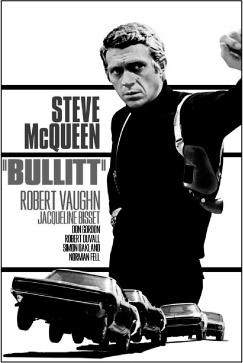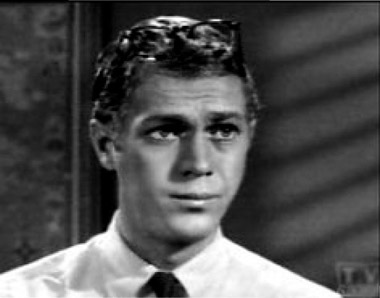
JIMMY’S AFFAIR WITH
STEVE McQUEEN

In the early 1950s, three young actors in New York—James Dean, Paul Newman, and Steve McQueen—frequently arrived for the same casting calls. Mostly, the auditions involved teleplays, but in some cases they were for an aggressively sought-after role on Broadway.
Jimmy’s agent, Jane Deacy, was quoted as saying: “That trio of good-looking men came to be viewed by directors as the same “type.” If Jimmy were right for a role, it was also deemed suitable for either Newman or McQueen. Later, film directors in Hollywood more or less had the same view, too. Jimmy was set to star in Somebody Up There Likes Me, in which McQueen would play a small role. After Jimmy died, Newman was cast as the lead. McQueen also thought he’d be a more ideal choice to have played Jimmy’s role in his three big feature films, especially Giant.”
Deacy’s remarks were later confirmed by Shelley Winters. “Steve told me he’d have been better than Dean in East of Eden, Rebel Without a Cause, and in Giant, too.
She quoted McQueen as saying, “The role of Jett Rink in Giant had my name written all over it. The scene where Dean got drenched from the oil gushing out of the well seemed ripped from a page of my own life. When I was a kid in Corpus Christi, I was hired as a roughneck, a job that used to be called a roustabout. I worked at drilling sites and, on many an occasion, I was bathed in oil.”
“At night, I hung out in seedy taverns with wildcatters. That trade is full of men with empty pockets and big dreams.”
“If I’d been in Giant, I would have fucked Elizabeth Taylor, Rock Hudson, and Sal Mineo.”
Author David Dalton collectively referred to Newman, McQueen, and Dean as “a cluster of types. A new kind of hero was coming into being, and it was inevitable that a lot of people shared the same idea. In the beginning of their careers, their personas were just drawing boundaries, and they were sensitive about being compared to each other.”
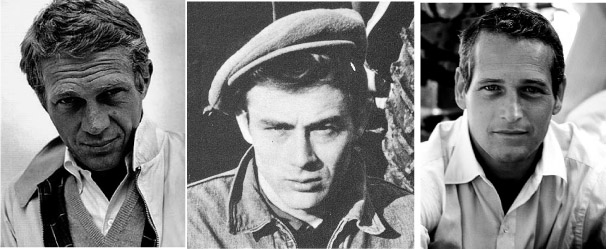
MANFLESH AND GRIST FOR THE HOLLYWOOD MILLS
Three ferociously competitive young actors emerged during the 1950s, each auditioning for the same types of roles. Each of them studied, and in some cases, mimicked the others’ styles. Above, left to right: Steve McQueen, James Dean, and Paul Newman.
In the beginning, Jimmy bonded with his fellow actors, even becoming intimate with them. A bisexual streak prevailed among all three men. Specifics about the bonding between Jimmy and McQueen has never been fully explored, because many of the details are missing. But in the wake of Jimmy’s death, some eyewitness accounts surfaced, although still remaining sketchy.
In The Mutant King, a biography of James Dean, Dalton wrote that McQueen one night at a Hollywood party encountered Martin Landau, a good friend of Jimmy’s. McQueen told Landau, “We’ve met before.” He reminded him that he had first seen him when he’d driven his car into a garage on West 69th Street in Manhattan. A few minutes later, Jimmy roared in on his motorcycle. “Work had to be done on both vehicles, and I was the mechanic on duty,” McQueen said.
What eventually evolved from that happenstance meeting in the garage was provided by Rogers Brackett, who was supporting Jimmy at the time and living with him in his apartment. “Perhaps to make me jealous, Jimmy confessed to me how he’d initially met McQueen and how he hooked up with him later. At the time, I had never heard of him. That day at the garage, after Landau went away, Jimmy slipped McQueen a slip of paper that said ‘CALL ME.’ The number he gave him happened to be my number, because Jimmy was living with me at the time.”
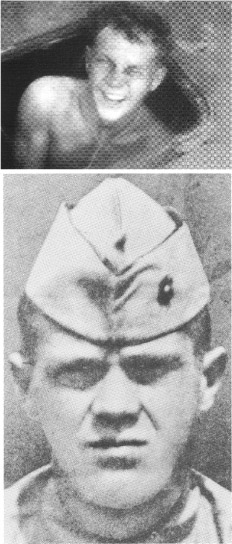
Young Steve, as a Marine (both photos above). Like Jimmy, it took some conscious effort for him to develop and evolve his style as an actor.
As was so often the case with Jimmy, he provided an entirely different account of what happened that afternoon in the garage to author Michael Munn. At the time, McQueen had not been able to snag an acting gig, so he took a job as a mechanic instead. “I figured my acting career was over,” he told Munn. “No offers. But then one day in comes James Dean, and I serviced his car.” [Actually, it was a motorcycle.] “I felt humiliated because I knew I should have been making money acting, and now I was servicing Dean’s fucking car.”
Brackett claimed that Jimmy’s seduction of McQueen first took place in his apartment during a time when he was away in Chicago shooting a commercial. “Those guys used my bed. Jimmy later told me all about it. He claimed that McQueen was not a great lay and just lay there with him doing all the work. And from the things I heard among show-biz pros, McQueen was and continued to be willing to drop his shorts for career advances. So was Jimmy, for that matter.”
Jimmy presented yet a different version of his sexual link to McQueen to Stanley Haggart. “I know why girls and some men grow crazy over Steve as a lover. He has great technique: He tongues you all over and gets you so worked up you’re hot as a firecracker. Then he comes on like gangbusters. We’re equally matched in sexual equipment. We could be brothers. That is, if brothers commit incest.”
“I always thought that Jimmy was more gay than straight,” Brackett said. “But from what I later heard, McQueen was more the ladies’ man. That didn’t mean he hadn’t done a lot of hustling like Jimmy himself. He had had some affairs with men on the side. It was later revealed that he’d played in some porn movies in Cuba. Let’s write him up as bisexual. When stars like Monty Clift or Brando rang up McQueen, he always seemed ready, willing, and able to show up at their doorstep.”
“Jimmy, indeed, had an affair with McQueen,” Brackett claimed, “But at the same time, he was carrying on with other actors and had a girl or two on the side. And he took care of me. Boy, did he have stamina. He was one busy boy.”
Paul Darlow, a friend of Jimmy’s, told author Christopher Sandford about an encounter he’d witnessed between Jimmy and McQueen at Jerry’s Tavern. Darlow was sitting with them.
Jimmy suddenly ordered McQueen, “Do my hair.”
“McQueen rose from the table and obliged,” Darlow said. “He patiently back-combed Dean’s soon-to-be famous hair, making it thick and shiny as a mink’s. McQueen was breathing and lightly chuckling down the back of Jimmy’s neck.”
By this point in his career, Jimmy had started to carry around a hairbrush. His agent and a few directors had complained about his unruly hair. Darlow later speculated, “Perhaps Jimmy was getting made up for his next casting call, with the understanding that he’d be competing with well-groomed actors.”
After he’d applied the finishing touches to Jimmy’s hair, McQueen asked him, “Would you do mine?”
“Drop dead,” said Jimmy.
“Come on, JD, don’t you dig my fur?”
“No,” Jimmy said. “It always looks so Dago to me.”
Despite the putdowns, Jimmy was still seen coming and going from McQueen’s shabby little apartment on the fifth floor of a tenement building on East 10th Street, where the rent was twenty-five dollars a month. Its bathtub was in the kitchen, directly adjacent to his gas-burning stove. When the bathtub wasn’t being used, McQueen covered it with a lid and used its surface as a countertop.
The veteran actress, Uta Hagen, once invited McQueen and Jimmy to a student performance at the HB Studio. It was understood that when it was over, members of the audience would deliver their critiques. Karl Malden was also invited. Jimmy had met him at the Actors Studio and had also seen his performance in the film version of A Streetcar Named Desire (1951) with Brando and Vivien Leigh.
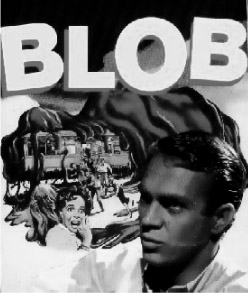
“Critics accused me of imitating the acting style of James Dean in that stinker, The Blob,” McQueen said. “Maybe I did. But from now on, I’m going to be Steve McQueen, an original.”
“I arrived late and sat in the back row,” Malden later said. “McQueen and Dean were about twelve feet away. They weren’t watching the play—Ibsen, I believe—but were into each other. They engaged in what we used to call a necking session. Dean giggled, but McQueen was more the silent type. A lot of actors back then, if you could imagine such a thing, called those two ‘swishes,’ but in my view, both young men were too macho for that label. I didn’t condemn their sexual behavior, but there was a time and place for everything. They had been invited to watch the play and to take it seriously. Their commando act could wait for later.”
“At the end of the play, I stood up and advised those two lovebirds to get a room.”
The bonding between Jimmy and McQueen flourished, but only for a while. According to claims from other actors, “McQueen came to idolize Jimmy. In his auditions, he began to sound like Dean.” Those words came from James Sheldon, one of Jimmy’s mentors.
McQueen told Sheldon, “Jimmy is the greatest actor in New York, much better than Clift and Brando. If he’s influenced me, so what? I don’t want to sound like a mushmouth like Brando.”
Five years after Jimmy’s death, in reference to McQueen’s performance in The Blob (1958), critics claimed that in it, “He stole the persona of James Dean, adapting it for his own acting style. James Dean is not dead! He lives on in Steve McQueen.”
Biographer Penina Spiegel explained why McQueen was called “The Shadow” by certain actors who knew both Jimmy and him. “He seemed to stalk Dean,” she wrote. “They shared a certain sulky arrogance, a self-absorbed moodiness, and an intense sexual appeal. Yet while Dean went on to collect film roles, McQueen was still struggling, still going nowhere.”
Not just Spiegel, but others, noted how McQueen followed Jimmy around “like a puppy dog trailing its master.” Ironically, the same charge was being made about Jimmy stalking Brando.
McQueen tried to emulate Jimmy in almost any action or bit of stage business he made. At the Blue Ribbon Café, he would order what Jimmy ordered. McQueen used to drink his coffee with cream, but when he saw Jimmy drinking his black, he gave up on the cream.
“Steve would even imitate Dean’s reading of a newspaper, how he held the paper, how he turned the pages,” Spiegel wrote.
Mildred Sacher, at the Blue Ribbon Café, frequently saw McQueen and Jimmy sharing a table. She came there daily to catch up on the latest gossip and to learn of any auditions for Broadway plays. “I remember James Dean and the guy who later became Steve McQueen. He was calling himself ‘Steven’ in those days. They came in together almost every afternoon. They never paid attention to anybody else, just talked to each other. McQueen seemed to hang on Dean’s every pronouncement as if it were God’s word. It was clear to me that McQueen idolized Dean, perhaps wanted to be him. All the girls back then—mostly out-of-work actresses—thought Dean and McQueen were gorgeous, at least in a slightly offbeat way. I never flirted with them. I assumed they were satisfied with each other and didn’t need a woman interfering.”
Many men who lived in Greenwich Village [i.e., the West Village] in the early 1950s recalled McQueen and Jimmy riding shirtless on their motorcycles through the district. “They wove dangerously in and out of traffic,” claimed Samuel Miller, a florist, who lived in an apartment building near McQueen when he moved there from the East Village.
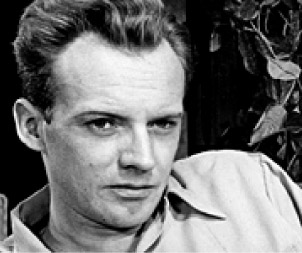
Arthur Kennedy had the rare privilege of working with both James Dean and Steve McQueen on the stage and on the screen. He starred with Jimmy on the stage in See the Jaguar and with McQueen in the Paramount movie, Nevada Smith (1966), based on a character in the Harold Robbins novel, The Carpetbaggers.
“They were always speeding. I don’t know how fast they were going, but enough so to be a menace. If you heard them coming, you got out of their way. They seemed to be daring Fate, tempting Her to cause an accident.”
“They sure liked to take their chances. They also showed off their bodies, often in shorty-short shorts. They weren’t exactly Steve Reeves, but they were sexy nonetheless. Such scrumptious testosterone. A guy can dream, can’t he?”
Arthur Kennedy, who had co-starred with Jimmy in See the Jaguar, recalled McQueen attending all five performances of the short-lived play, and coming backstage to rave about Jimmy’s acting. “He didn’t mention my acting,” Kennedy said. “I didn’t learn until later that they had a reputation for seducing girls, especially McQueen. When I saw them, they had eyes only for each other.”
“I went out with them on two different occasions for some serious boozing,” Kennedy said. “They were real hotheads. If someone looked at one of them, especially the wrong way, they were ready for a fist fight. In Dean’s case, perhaps a knife fight. He still carried around that lethal weapon with which he’d threatened Michael Gordon, the director of See the Jaguar. I felt that Dean would one day completely lose it and stab someone.”
McQueen was aware of the anger bubbling inside Jimmy, as well as his own anger management problem. “Jimmy seemed all too eager to stab someone, but he can thank Jupiter, or whatever god he worships, that he never did. Prison rapists would have had a field day with him.”
“When I was much younger, I would go to war if someone looked at me the wrong way,” McQueen said. “Hell, one afternoon, I stole a knife from a butcher’s shop and went home to kill my mother and shithead stepfather who had been sexually molesting me. Fortunately, they weren’t at home, and I got a grip on myself.”
“In spite of his violent streak, Dean had a sensitive side,” Kennedy claimed. “But I found McQueen hostile on most occasions. To me, he remained the eternal juvenile delinquent. I’d heard awful stories about him—reform school, rolling drunks, breaking into houses. I thought he was a very unsavory character and could only harm Dean. I once advised Dean to drop McQueen. ‘Nothing good will come out of your relationship with him,’ I said.”
Jimmy was defiant at the suggestion. “I don’t drop an acolyte until I’m finished with him. When I accomplish what I want with him, then he’s toast.”
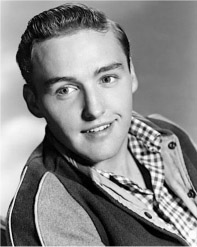
Dennis Hopper: “As an actor, I was confused. Should I be a new James Dean, or a new Steve McQueen?”
Kennedy asked, “What could you possibly want with McQueen other than the obvious? He’s rough around the edges. He must have barely made it through the eighth grade.”
“Don’t put him down,” Jimmy said. “He’s got some good points. He’s like a wild stallion. He needs to be broken in. I’m the cowpoke in the saddle who can do that.”
“At the time, I didn’t know what made McQueen tick, but I got to know Dean rather well,” Kennedy said. “For a brief time, I was like an older brother he admired and looked up to, especially as an actor. There was talk that we were lovers. That’s ridiculous, of course. I wasn’t screwing him, but he did discuss his homosexuality with me. He lived in fear of exposure and what it might do to his career if he became a movie star. Broadway was a more tolerant place than Hollywood.”
“He also told me he was frustrated in his relationship with McQueen, because McQueen wouldn’t let him fuck him,” Kennedy claimed.
“He’s driving me up the wall, but he won’t give in to me,” Jimmy told Kennedy. “I’m going to get him high one night, tie him up, and rape him.”
“Dean never explained what ‘broken in’ meant, but I got his drift ,” Kennedy said.
“Amazingly, I got to know McQueen years later, when we both starred in the movie Nevada Smith,” Kennedy recalled. “He was the biggest star in the world then. At the peak of his career. I had totally misjudged this juvenile delinquent. It’s incredible how far you can climb in America if you get the breaks. I ended up with the greatest respect for him as an actor. Of course, he had the morals of an alleycat, but that was part of his macho charm.”
Journalist John Parker noted, “In between selling ballpoint pens, McQueen was slowly emerging into the spotlight. He and Dean led parallel lives—penniless and often at low ebb.”
Dennis Hopper, on the set of Rebel Without a Cause, claimed that Jimmy was having an image problem. He quoted him as saying: “You know, I’ve got to make it as James Dean. In this hand, I’m holding Marlon Brando, saying, ‘Fuck you!’. And in this hand, I’m holding Monty Clift, saying, ‘Please forgive me’. And so it goes. ‘Fuck you. Please forgive me.’ Somewhere in the middle, you’ll find James Dean.”
“After The Blob (1958) was released, many people in Hollywood told me to stop acting like Dean,” McQueen said. “They assured me I had my own unique talent and that I should let Dean die in the Porsche graveyard. That I should go on and be myself. And so, I followed that advice. Fuck Dean’s sensitivity on screen.”
During the making of Never So Few (1959), co-starring Frank Sinatra and Peter Lawford, McQueen told Lawford, “I intend to become the screen’s most idolized tough guy. I’m abandoning Dean’s sensitivity on camera. After all, considering my background, the tough guy image is for me. I’ve tried many things—porn star, hustler, gigolo escort, merchant seaman, lumberjack, roughneck in the Texas oil fields, and a kick-ass Marine. Who better to star in TV’s Wanted—Dead or Alive, than me? If Dean could rise from his grave, he’d be imitating me today.”
Author Christopher Sandford wrote that “the nagging threat of homosexuality” hung over McQueen’s head. He was legendarily touchy on the subject. However, he took Bill Claxton, the photographer, on a tour of his former haunts in Manha an, including some of the places where he’d hung out with Jimmy. “He would show me where he’d lived, places he’d worked as a hustler,” Claxton claimed. “He had some pretty wild stories.”
Sandford noted that, “A persistent rumor that McQueen dabbled in cross-dressing was a vile slur, but expressed a view that some people had of him. Those were McQueen’s omnisexual days, when he soul-kissed James Dean and hustled around New York,” Sandford said.
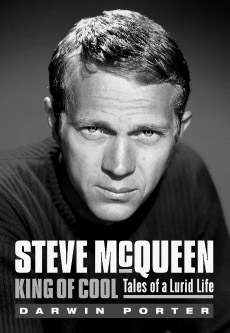
According to its author, Darwin Porter, as quoted in London’s Express: “Steve McQueen has become an iconic hero, forever cool, but it’s ironic because he was never really cool; he was a Molotov cocktail that could explode at any time. His fans never knew the real Steve McQueen.”
McQueen himself later admitted, “I lived on the brew and cocaine, along with acid, pot, and fuck-flings. Yes, I attended bisexual orgies, one of them taped by the FBI at the Gramercy Park Hotel in Manhattan. Dean was invited, but didn’t attend. I bet that ugly old queer, J. Edgar Hoover, got an eyeful watching the tapes of me in action. I bet his fat butt was twitching and his cocksucking mouth was slobbering when he saw me in all my glory.”
The most definitive portrait of McQueen’s private life appears in Blood Moon’s own biography— Steve McQueen—Tales of a Lurid Life, by Darwin Porter.
Addressing McQueen’s allure, author Penna Speigel wrote: “He was catnip for women. Women who from others would require courtship—dinners, roses, compliments—fell instantly into his bed like ripe fruit dropping from a vine. He had a wonderful vitality, a soaring, wild energy, combined with his striking blue eyes. Hard-muscled body, and his little boy vulnerability, this was a powerful appeal to women. Some of them were as surprised to find themselves in Steve’s bed as Lady Chatterley was to be in her gamekeeper’s.”
Rod Steiger, who had met McQueen at the Actors Studio and who had costarred with Jimmy in a teleplay, weighed in with his opinion. “I knew Brando. I knew Paul Newman. I knew James Dean. I understand why they made women—or men in some cases—turn hot under the collar. To me, McQueen looked like a grease monkey. From working on those cars and motorcycles all day, he seemed covered in grease, with dirty fingernails.”
“He was also illiterate. He couldn’t converse on any topic except cars. Dean knew a little about a lot of things. Brando could converse on such subjects as civil rights for blacks. How Indians had been defamed in the movies, left-wing politics, turncoat commie-outing Elia Kazan, and James Dean, one of his favorite topics.”
“McQueen was a narcissist,” Steiger continued, “although I don’t think he knew what it meant. He shared that quality with Brando and Dean. But when McQueen told a gal, ‘Come here, baby,’ the bitch came running.”
Jimmy left McQueen, among others, behind when he went to Hollywood to star in East of Eden. But he still called McQueen on infrequent occasions. “I haven’t forgotten you, kid,” he said. “Why don’t you come out to the coast? I’m sure I can find a job for you out here somewhere.”
As tempting as that offer was, McQueen turned him down, preferring to remain dejected and broke in Manhattan. He felt he had a better chance there, either in finding roles in teleplays or perhaps on Broadway.
Not wanting to make his plight appear too dire, McQueen bragged about his conquests with women, including his on-again, off-again affair with Shelley Winters. “I’ve picked up with her just where you left off.” He also bragged to Jimmy that he was sleeping with many wannabe actresses, claiming, “I find the pickings great at coffeehouses on Bleeker Street.”
Not to be outdone, Jimmy boasted, “Since arriving in Hollywood, I’ve been getting so many propositions from both men and women that I’m going to have to hire a social secretary. Some of the biggest names in Hollywood are after me. But that was true even before I became famous. You either have it or you ain’t got it, the way I figure it.”
Late one night in New York in 1954, McQueen picked up his phone after its fifth ring. “Hi,” came a voice over the wire. “I’m in town and ready to fuck.”
“Who in hell is this?” McQueen asked sleepily.”
“It’s Jimmy,” came the voice. “The toast of Hollywood. Your rebel without a cause. I’m calling you because you’re the only guy in New York who knows how to use your pecker.”
“Well, I’ll be a rat’s ass,” McQueen said. “The bigtime movie idol himself. Get that much-used ass of yours over here.”
According to reports, Jimmy and McQueen were up all night, rising at around two o’clock the next afternoon for a very late breakfast at their once-regular turf, the Blue Ribbon Café.
Jimmy tantalized McQueen with his adventures in Hollywood. He seemed amused by his growing reputation and the scandalous stories already being spread about him. “The word is I’d fuck a snake—and have—to get ahead. Whoever said that was right on the mark.”
Jimmy told McQueen about the wild affair he’d had with a very young Sal Mineo, who had portrayed Plato in Rebel Without a Cause. “Sal plays the first gay teenager in movies. Nicholas Ray filmed a scene in which we kiss, but I’m sure that will end up on the cutting room floor.”
“Some people in the press are writing that my personality is androgynous,” Jimmy told him.
“I don’t know what that means,” McQueen said.
“Neither do I.”
During the course of their day together, McQueen began to realize how Jimmy had changed after two movies in Hollywood. He filled him in on stories of his visits to The Club in Hollywood, an S&M bar and hangout for the leather set. He claimed he’d discovered the pleasure of having guys stub out their cigarettes on his ass, and even showed McQueen some of the burns.
“Don’t try to pull any of that shit with me,” McQueen warned.
“I won’t,” Jimmy said. “You’re not the type to enjoy the pleasure of pain, only the infliction of pain on others.”
“You got that right!” McQueen answered.
Before mid-afternoon, Jimmy revealed his secret career moves. “Offers are pouring in even from fuckers who haven’t seen my films. I may be offered a part in Edna Ferber’s Giant, which is set in Texas. There’s talk that I’ll star opposite William Holden. “
“I’m also after another role,” Jimmy said. “Robert Wise is talking to me about playing Rocky Graziano in a movie called Somebody Up There Likes Me (eventually released in 1956). That’s my lead-in for us to go to the gym today. I want to practice my boxing.”
“That’s not for me,” McQueen said. “I tried boxing. I’m no good at it.”
Jimmy could be very persuasive, and soon McQueen found himself in a Brooklyn gym boxing with the actor.
Unknown to either of them that day, there would in the near future appear two additional contenders for the role of Rocky Graziano in that film, such formidable talents as Marlon Brando and the ultimately successful actor who got the role, Paul Newman.
***
After that, Jimmy disappeared to do whatever he was doing in the precious few months that remained for him on this Earth. To his surprise, McQueen, still in New York, received another call from a Hollywood star, Rock Hudson himself, who reminded McQueen that they had met while he was bartending at Monty Clift’s party.
“I know who you are,” McQueen told him, “and I don’t need to be reminded of where I met you. How can a guy forget meeting Rock Hudson?”
“I’ll take that as flattery,” Hudson answered. He invited McQueen for dinner that night at his hotel, holding out a tantalizing proposal. “I think I’ve found the ideal role for your movie debut.”
That night, in his hotel suite over a steak dinner ordered from room service, Hudson was gracious and charming and filled with anecdotes about Hollywood. He also had a sense of self-deprecation delivered with good humor. “A friend working with John Wayne told me the Duke, referring to me, said, ‘What a waste of a face on a queer. You know what I could have done with that face?’”
“I have this great friend, Mark Miller,” Hudson said. “Before coming to New York, he warned me, ‘Just because it wiggles, you don’t have to fuck it.’”
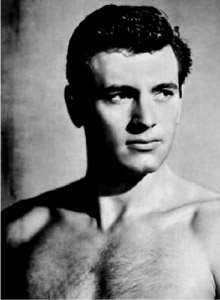
Rock Hudson to Steve Mc-Queen: “I don’t want to co-star with James Dean in Giant. I want you to play Jett Rink.”
Eventually, Hudson got down to business. He told McQueen that all of Hollywood was talking about the casting of Giant (released in 1956), based on the Edna Ferber novel and set in Texas. “William Holden wants it. Alan Ladd wants it. Gary Cooper wants it. Clark Gable wants it. But right before flying to New York, George Stevens, its director, called me to say that the role of Jordan Benedict belongs to me. Those other golden oldies can sit around their dens looking at old movie stills of themselves. The Hollywood of the late 50s will belong to guys like us. Incidentally, I’ll be appearing opposite Elizabeth Taylor. I know you know her. I saw her talking to you when you were tending bar at Monty’s party.”
“Miss Taylor doesn’t have a clue as to who Steve McQueen is,” he answered. “But she’ll get the idea one night when I’m fucking her.”
Hudson appeared only mildly startled by that statement. “Here’s how you fit in. Stevens is considering Jimmy for the role of Jett Rink, but I don’t want him anywhere near that movie. The bastard will upstage me. I’m trying to persuade Stevens to cast you instead.”
“Hey, pal, that sounds great, but I don’t know if I’m up to such a big break,” McQueen said.
“Do you think I was up for my big breaks when they happened?” Hudson asked. “I was thrown into a part and ran with it. There I was appearing opposite Oscar winner Jane Wyman, and I didn’t have the experience. Sometimes Hollywood throws you into the bigtime whether you’re ready for it or not.”
“Let’s go for it,” McQueen said. “I’m a fast learner.”
“It’s not definite, and Stevens is a hard man to convince, but I wanted your permission before I begin my big push of you,” Hudson said. “There’s no way I want to work with Dean.”
Years later it was revealed that McQueen was just one of many young actors that Hudson promoted for the role of Jett Rink. The speculation was that he feared that Jimmy, based on the favorable reviews of his previous films, would steal the movie from him.
Ever the opportunist, Hudson also used the role of Je Rink as an alluring tool for seduction, even though he made it clear that he had only the power to recommend a candidate, and that he wasn’t responsible for the final casting decisions.
A room service waiter reported that he found both men in bed together and presumably nude when he delivered their breakfast the subsequent morning in New York.
Before leaving New York, Hudson promised that he’d hang out with McQueen when he made it to the coast, regardless of the outcome of the casting of Giant.
“I have this gut instinct that we’re going to work together one day, and that each of us, in our own separate ways, is going to become the biggest box office attraction in the country.”
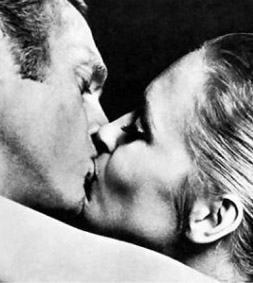
In The Thomas Crown Affair (1968), Steve McQueen and Faye Dunaway performed what some critics called “The sexiest kiss in the history of cinema.”
***
When Jimmy left New York to fly back to Los Angeles, both he and McQueen were filled with rosy visions of their future. When they kissed and embraced, it was for the last time.
The next news McQueen heard about Jimmy came a few months later via television. His friend was dead in a car crash in California.
“I’ll probably die in a machine, just like Jimmy,” McQueen told the actor, George Peppard. “I can see it now. Some lonely stretch of highway along some back road somewhere. Death will be instant. I’m sure my head will be severed like Jimmy’s. But what a way to go. Floor-boarding it and rushing head-on to meet death. If cars weren’t meant to go fast, they wouldn’t have been made to do so. Man craves speed. The only time I feel really alive is when I’m speeding and defying death. I understand Jimmy’s need.”
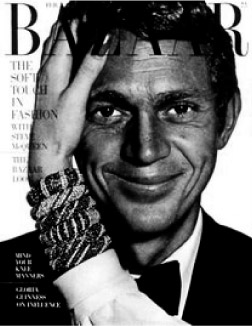
Steve McQueen told a reporter that he and James Dean shared the same philosophy of life. “I live for myself and I answer to nobody. The last thing I want to do is to fall in love with some broad.”
McQueen rather callously told Hudson and others one drunken night, “I’m glad Dean is dead. That eliminates my main competition.”
When Jimmy passed on from this world in 1955, McQueen transferred his idolatry of the late star to another emerging star, Paul Newman. He also redirected the jealousy he’d felt about Jimmy onto Newman, who was getting starring roles before he did.
Comparisons between the two stars became a part of the national consciousness, and widely publicized. In a discussion by feminist icon Erica Jong about the difficulties of achieving the “ultimate orgasm,” she wrote in Esquire: “Who has the bluest eyes, Newman or McQueen? It is difficult to say, but McQueen’s twinkle more. He makes me think of all those leathery-necked cowboys at remote truck stops in Nevada. Does he wear pointy boots? And does he take them off when he screws?”
In the wake of Jimmy’s death, a writer cited McQueen as “The Next James Dean,” and a reporter for Movie World wrote: “Steve McQueen is the logical successor to James Dean. The clique that worships Dean has a new Messiah in McQueen. Luckily, he is living longer than Dean did, so the cult will have a long, long time to thrive.”
When McQueen read that, he said, “Fuck it! I want to be the next Bogie.”
Despite the forecast of Movie World’s columnist, Steve did not have that much longer to live. He died of a heart attack at the age of fifty in 1980.
But before that, he evolved into a top-tier movie star, luring audiences to the box office throughout the 1960s and 70s with such hits as The Great Escape (1963), The Cincinnati Kid (1963), The Sand Pebbles (1966; it led to Steve’s nomination as Best Actor that year); Bullit (1968); The Magnificent Seven (1970), Papillon (1973), and The Towering Inferno (1974), within which he competed with Paul Newman for top billing.
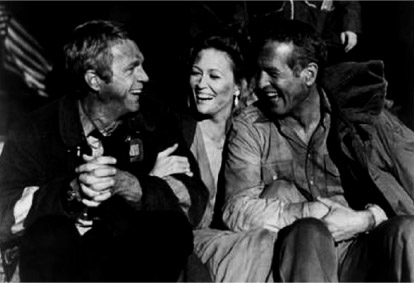
McQueen, Faye Dunaway, & Paul Newman in The Towering Inferno (1974)
